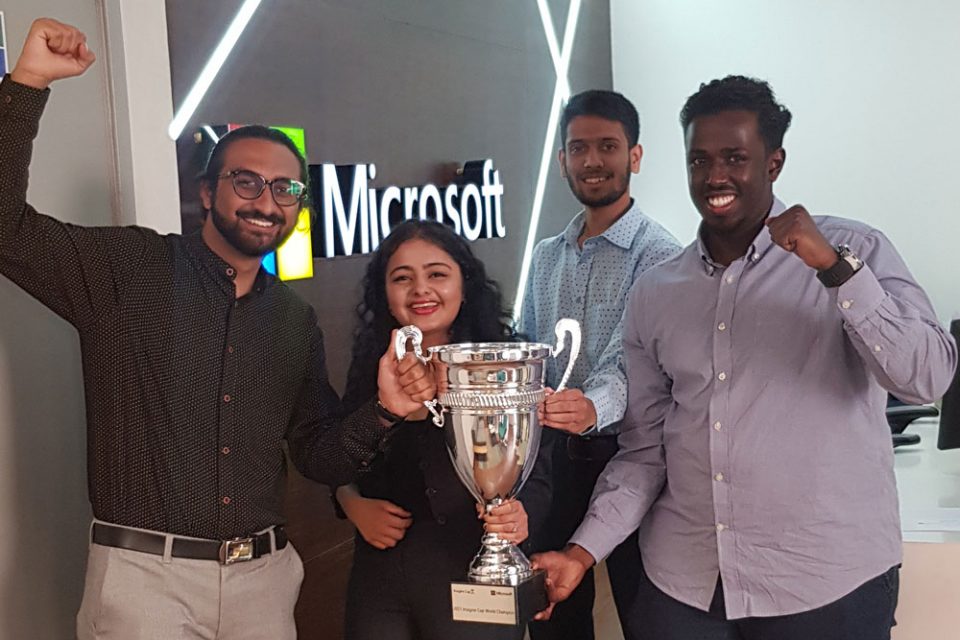May 26, 2021 | Microsoft News Center
At the 19th annual Imagine Cup Championship, held during Microsoft Build’s digital experience on May 25, Kenya’s Team REWEBA won for its IoT-based infant-monitoring solution. Dharmik Karania, Jeet Gohil, Khushi Gupta, and Abdihamid Ali – all students from the United States International University-Africa in Kenya – walked away with USD75,000, a mentoring session with Microsoft CEO Satya Nadella, and a USD50,000 Microsoft Azure Grant.
More than just a technology competition, the Imagine Cup has given a platform to over two million student competitors, all innovating for impact. The competition highlights how tech can enable real-world community solutions – in this year’s case, for marginalised communities in Kenya who have access barriers to crucial infant healthcare. “Team REWEBA’s win is also a huge win for digital transformation in Kenya. It is incredible to see the next generation embracing technology as a powerful tool for positive change,” says Kendi Ntwiga-Nderitu, Country Manager for Microsoft Kenya.
Thousands of students from 163 countries participated in the 2021 competition spanning four social-good categories – Earth, Education, Healthcare, and Lifestyle. Only four finalist teams – representing Kenya, New Zealand, the United States, and Thailand – were selected to present at the championship.
Judges for the event – Jocelyn Jackson, Enhao Li, and Toni Townes-Whitley – were chosen for their innovation and industry expertise within technology, diversity, start-up, and social-impact areas, which align to Imagine Cup’s core mission. Microsoft’s Business Program Manager Tiernan Madorno and Partner Program Manager Donovan Brown kicked off the event as show hosts, introducing the judges. The top four teams then presented their solutions, assessed for technology use, diversity, originality, and innovative design. Watch the show to see Team REWEBA’s win!
Team REWEBA’s innovation in the Healthcare category
REWEBA, short for Remote Well Baby, mimics the process of in-hospital post-natal screening. By combining machine learning, IoT, analytics, and more, it digitally monitors babies’ growth and health parameters, sending this information to doctors for timely intervention.
The solution addresses a major community issue. Members of the team had interned at a local hospital, learning first-hand the challenges mothers can face traveling long distances for infant screenings. Lack of healthcare access in marginalised communities, compounded by the COVID-19 pandemic, contributes to a high infant mortality rate.
In developing their solution, the team realised how beneficial IoT could be. Team member Jeet Gohil shared that, through building REWEBA, they discovered “a lot of technologies, for example Azure DevOps, IoT, and Functions. We learned a lot about how to build IoT systems.”
Team member Khushi Gupta says the solution is about enabling equal access to healthcare services and saving infants from fatal diseases: “Africa has the highest number of {infant mortalities}, highlighting the gap in healthcare services. REWEBA is the only remote healthcare solution that provides regular growth monitoring for infants from the comfort of the home, while also giving direct access to doctors for immediate intervention.”
Looking ahead
Team REWEBA hopes to enhance and scale the project, to include more screening factors and a post-natal screening device for mothers. They want to launch a start-up in Kenya to enable even better access to healthcare services in marginalised areas.
“What a great honour and privilege for our students to be recognised at such a global platform. The future is indeed digital and I’m proud to see our students use their academic exposure to build an application that with immensely support our country to reduce infant mortality and at the same time, scale it to a global level”, said Paul Tiyambe Zeleza, Vice Chancellor, (President) and Professor of the Humanities and Social Sciences at the United States International University-Africa
When asked how this win will impact their project, the team responded, “The winning prize and the Azure grants will take our project up a notch, and we envision saving millions of babies’ lives all around Kenya. We plan to extend throughout Africa and India as well, as these are the countries where infant mortality is really high.”




